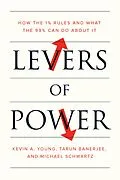It's no secret that "the 1%" - the business elite that commands the largest corporations and the connected network of public and private institutions- exercise enormous control over U.S. government. While this control is usually attributed to campaign donations and lobbying, Disruptive Power argues that corporate power derives from control over the economic resources on which daily life depends. Government officials must constantly strive to keep capitalists happy, lest they go on "capital strike" - that is, refuse to invest in particular industries or locations, or move their holdings to other countries - and therefore impose material hardship on specific groups or the economy as a whole. For this reason, even politicians who are not dependent on corporations for their electoral success must fend off the interruption of corporate investment.
Disruptive Power documents the pervasive power of corporations and other institutions with decision-making control over large pools of capital, particularly the Pentagon. It also shows that the most successful reform movements in recent U.S. history - for workers' rights, for civil rights, and against imperialist wars - succeeded by directly targeting the corporations and other institutional adversaries that initiated and benefitted from oppressive policies. Though most of today's social movements focus on elections and politicians, movements of the "99%" are most effective when they inflict direct costs on corporations and their allied institutions. This strategy is also more conducive to building a revolutionary mass movement that can replace current institutions with democratic alternatives.
Autorentext
Kevin A. Young is Associate Professor of History at the University of Massachusetts Amherst.Tarun Banerjee is Assistant Professor of Sociology at the University of Pittsburgh.Michael Schwartz is Distinguished Teaching Professor of Sociology Emeritus at Stony Brook University.
Klappentext
In this urgent and timely book, Patrick Cockburn writes the first draft of the history of the current crisis in the Middle East. Here he charts the period from the recapture of Mosul in 2017 to Turkey's attack on Kurdish territory in November 2019, and recounts the new phase in the wars of disintegration that have plagued the region, leading to the assassination of Iranian General Sulemani. Cockburn offers panoramic on-the-ground analysis as well as a lifetime's study of the region. As author of The Rise of Islamic State, and the Age of Jihad, he has proved to be leading, critical commentator of US intervention and the chaos it has wrecked/ And here he shows how, since Trump entered the White House promising an end to the Forever War, peace appears a distant possibility with the continuation of conflict in Syria, Saudi Arabia's violent intervention in the Yemen, the fall of the Kurds, riots in Baghdad, and the continued aggression towards Iran. While ISIS has been defeated, it is not clear whether it has disappeared from the region. Trump's policies has appeared to pour petrol on the flames, emboldening the other superpowers involved in the proxy wars. Following the collapse of the deal with Iran, and the threat of war crimes, is a new balance of power possible?
